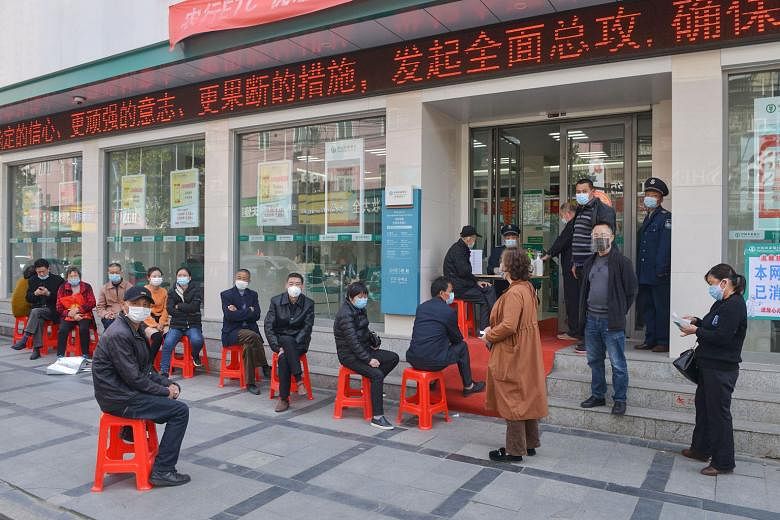The Chinese health authorities yesterday reported no new local coronavirus infections for the second day in a row, with all 39 cases imported ones.
As China appears to have brought the epidemic under control, there are fears of a second wave of infections brought back by a rush of Chinese expatriates returning home in a bid to escape a global pandemic that has led to cities locking down and countries shutting their borders.
"The number of imported cases in China has further increased, and so the pressure to be on guard has also increased," Mr Wang Bin, an official of the National Health Commission (NHC), said at a news conference yesterday.
There are 228 imported cases in total, the NHC announced yesterday, the lion's share surfacing in Beijing, where most are passengers in transit, the local government said.
Dr Chen Zhihai said during a news conference on Thursday: "A lot of those coming in tried to hide their travel history, or even took medication to suppress fevers just to get on a plane."
Dr Chen is head of Ditan Hospital in Beijing, where suspected coronavirus cases are taken.
"I urge those in affected areas to stay wherever you are and try to seek treatment there if you are ill. Don't bring the risk of infectious diseases to the rest of the world."
Among the thousands of returning Chinese was 19-year-old student Alan Liu, who took nearly 96 hours to fly from Boston in the United States, where he attends high school, to his home in Guiyang city, in south-west China.
Along the journey, he had to transit in Seattle and Hong Kong, and spend 18 hours in a Beijing hospital because he had a slight cough and runny nose.
Mr Liu said he initially wanted to stay in Boston but his parents, who felt it was safer in China, insisted he return, booking him an 80,000 yuan (S$16,300) ticket on business class because "it is less risky with fewer people around".
But after reporting his symptoms on a health declaration form, he was pulled out at Beijing Capital Airport and taken to a hospital, where he spent the next 18 hours waiting for his test results.
"After more than 14 hours of waiting, it didn't matter whether I had (the virus), I just wanted to get my results and move on," he told The Straits Times from Guiyang, where he is now under quarantine.
Mr Liu tested negative and was taken to a designated quarantine hotel, where he spent a night "and 50 yuan on an instant noodle meal", before being taken to the airport in the morning for his flight home.
Beijing municipality has implemented onerous measures to prevent imported cases from reaching the community.
International flights to Beijing operated by Chinese carriers would be directed to nearby cities like Tianjin, Hohhot and Taiyuan, China's civil aviation authority announced, suggesting that the capital could be stretched for resources in screening and handling incoming travellers.
Since last week, the capital's airport has set aside a special zone for international flights, with health checks required for all disembarking passengers.
Non-transit travellers are sent to designated sites for a 14-day quarantine, where they must pay the bill themselves.
But the uneven implementation of such rules across Chinese cities have left lingering fears of cases slipping through.
Police said yesterday they are investigating a Hubei woman who staged an elaborate scheme just to get back to work in Beijing.
Some returning expatriates had lied on their health declaration forms or tried to take fever suppressants, while an Australian Chinese woman under quarantine was fired from her job after she refused to wear a mask while jogging and had a scuffle with the authorities.
Response on social media has been harsh.
"You are coming back to escape the virus, not to be a lord," one Weibo user commented on a video of the kerfuffle, while others called returning Chinese "rich brats".
Even state media has weighed in.
"Those returning from over-seas should act in a more responsible and civilised manner... in a country they now deem to be a safe haven," said a China Daily editorial on Thursday.
Beijing is also under pressure to ensure infections in the capital are under control for its annual gathering of Parliament, initially scheduled for early this month.
Media reports have suggested it could be held late next month or early May.











